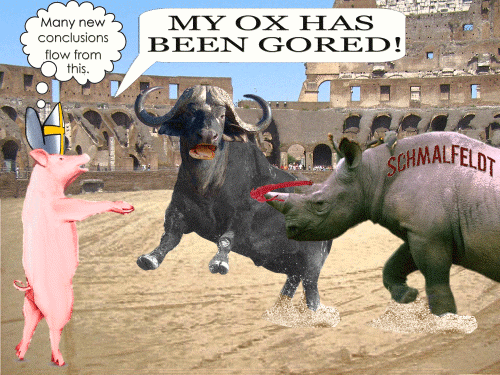|
Thought Crime and Its Devotees
by Charles Carreon
August 10, 2013

Thought crime in progress provokes reflection.
Why is it that when bad things happen to other people, we
don’t feel them in the same way as when they happen to us?
We have a lot of faith in other people’s capacity to bear
stress and pain. For all the bad things he says about me,
Ken Popehat White has a lot of faith in my actual mental
stability. He’s not afraid that I’ll hurt him physically or
destroy his property. That’s nice, because I wouldn’t want
him or anyone to worry about their physical safety on my
account. The whole concept of forsaking violence as a cost
of being a member of civilized society seems, to me, a fair
trade. I don’t maim you, you don’t kidnap my children. We
have to draw the line somewhere. Verbal violence, imagistic
violence, poses and threats, all blur together.
Communication pumped up with hostility can be eloquent and
beautiful, crude and offensive, menacing and scary. Y’know,
punk rock? It’s hard, real hard to put limits on speech
based on its content. The more we allow ourselves to see,
hear and think previously taboo thoughts, the more we
realize many of the taboos are ridiculous. But not all of
them.
There is a taboo on getting involved in fantasizing graphic
violence being committed upon your chosen victims. Gilberto
Valle violated that taboo at length and is now facing life
in prison for plotting to kidnap and murder women. Most
people think that this means that he “is guilty.” No, that
is a misunderstanding of reality. Criminal guilt is an
absolute concept defined by the criminal law, and the jury
was given the task of trying, to the best of their limited
ability, to decide whether Valle had a criminal state of
mind when he wrote all those emails discussing which women
he would kidnap, how he would kill them and eat them, etc.
The juryconcluded that he’s guilty because
they were willing to decide that they knew, beyond a
reasonable doubt, what was going on in Valle’s mind when he
wrote the things he wrote. As Daniel Engber wrote
in Slate, after observing a couple of days of the trial:
[i]t’s hard to say exactly what valle is accused of
doing in the first place. he never kidnapped anyone, or
raped anyone, or murdered anyone. He was never violent
to the women who will take the stand. He’s never tasted
human flesh. But he thought about these things, and he
talked about these things. He may have even taken steps
to plan them out. But did he really mean to do them?
Engber’s article seems like a reliable account of a case
that was shaping up to go either way, depending entirely on
the jurors. Valle exchanged a lot of emails with another
guy whose wife said she knew he engaged in these crazy
pretend-to-plan-to-kidnap-someone games with other people
online, and a third guy, who was like a dungeonmaster type
in England who was egging them on. The conspiracy
conviction, of course, is quite unlikely to be overturned on
the grounds that Valle didn’t commit overt acts in
furtherance of the conspiracies, because writing people
emails telling them you’re going to buy rope to tie somebody
up and a cattle prod to torture them is an
overt act in furtherance of a conspiracy. But some jurors
would like to see the rope and the cattle prod, while other
jurors will send you to jail just for having a nasty
shopping list.
Meanwhile, back at the funny farm, Ken Popehat White is up
to his snout in the fine print of when verbal threats become
criminal because, because, well because, goddamn, he’s been
threatened. He thinks. Well not him, really, but another
lawyer might think, that this guy Bill Schmalfeldt has
threatened him. He’s really annoyed about it, because he
republished the better part of the guy’s rant. What’s so
funny is how White threatens Schmalfeldt while claiming he
is not threatening him. White gives us the word for what
he’s doing when he threatens to report someone to the
prosecution by not reporting them to the prosecution, and
merely writing a long, detailed blog post purporting to
analyze the criminality of threats of physical violence.
The word is “apophasis,” that Popehat explains is “the
rhetorical device of saying something by asserting you are
not saying it.” I’m just sayin’.
|